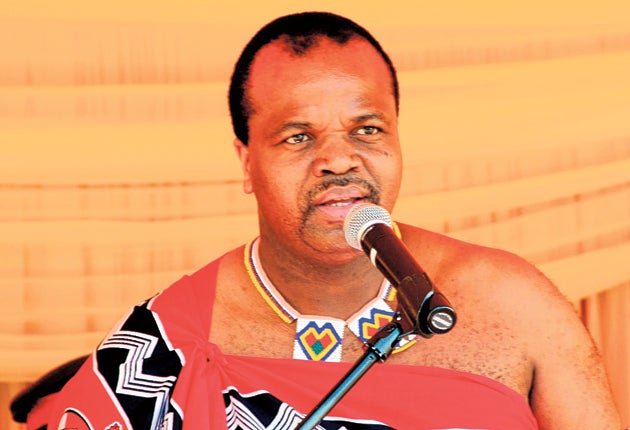Pressure grows on Swazi king to open up royal slush fund

Your support helps us to tell the story
From reproductive rights to climate change to Big Tech, The Independent is on the ground when the story is developing. Whether it's investigating the financials of Elon Musk's pro-Trump PAC or producing our latest documentary, 'The A Word', which shines a light on the American women fighting for reproductive rights, we know how important it is to parse out the facts from the messaging.
At such a critical moment in US history, we need reporters on the ground. Your donation allows us to keep sending journalists to speak to both sides of the story.
The Independent is trusted by Americans across the entire political spectrum. And unlike many other quality news outlets, we choose not to lock Americans out of our reporting and analysis with paywalls. We believe quality journalism should be available to everyone, paid for by those who can afford it.
Your support makes all the difference.Swaziland is facing mounting calls to open up a secretive fund allegedly used to bankroll the lavish lifestyle of its royal family, to help rescue the kingdom from its financial crisis.
The Tibiyo Taka Ngwane fund is believed to control as much as half of the Swazi economy, with interests in sugar, diamonds, banking and property, but allows no public scrutiny and pays no tax.
Africa's last absolute monarch was handed a controversial $355m (£217m) bailout by South Africa last week amid reports that hospitals were running out of medicines, public service salaries were going unpaid and Aids patients were eating cow dung to help digest life-saving drugs.
An alliance of businesses, opposition groups and trade unions have accused King Mswati III of using the billion-dollar investment vehicle set up "in trust" for the Swazi people as a private slush fund. "This fund was established through the sweat of the people and it must come back to the people who are now in need," said Skhumbuzo Phakati, the secretary-general of the opposition Pudemo party.
The fund, originally known as the Lifa Fund or "Wealth of the Nation", was set up in the 1960s when families were told to donate cattle to help buy back land from colonial settlers. After independence it was given a royal charter by Mswati's father, King Sobhuza II, and put under the monarch's direct control.
The fund has since grown to the point where it holds majority stakes in companies including the country's biggest exporter, Ilovo Sugar, Swazi Spa Holdings, a string of shopping malls and the Swazi Observer newspaper.
On its website the fund admits to being one of the "main role players" in Swaziland, adding that it is "most unfortunate that most people in the country are largely ignorant of what Tibiyo is, what it stands for and what it does".
Tibiyo insists that recent criticism stems from it not having "adequately blown its trumpets" over spending on education and cultural events. The fund failed to respond to repeated enquiries from The Independent.
The Finance Minister, Majozi Sithole, answered a recent petition for further information on Tibiyo with a letter saying: "These entities were formed in terms of a royal charter which does not provide for their income to be part of government income." Despite being led by a former prime minister, Tibiyo has no government oversight, and its assets do not appear in the budget or on any financial statements.
Mr Phakati said: "They are resisting calls to tax Tibiyo, because taxing Tibiyo would in effect be taxing the king." Catherine Grant-Makokera at the South African Institute of International Affairs said it was wrong to say the fund was held on behalf of the Swazi people as it "represents the assets of the royal family".
"The workings of the fund are such a closely held secret that even the finance minister has very little information," she said. "It's ironic that the government of Swaziland has no money but the head of state is one of the richest monarchs in the world."
King Mswati, 43, has ignored international pressure for democratic reforms and resisted calls from the World Bank and IMF to rein in his lifestyle, which includes shopping sprees for Maybach limousines and a string of palaces, in a country of 1.2 million people where poverty is endemic and life expectancy is below 50.
The king has banned opposition groups, but has encountered mounting protests, with unions demanding democratic reforms. A huge drop in customs revenues that landlocked Swaziland shares with South Africa has sparked public demonstrations.
While the kingdom has refused calls to trim the spending of the royal household it has agreed to demands from the IMF to cut public sector wages by up to 10 per cent. More protests are expected, with the Swazi democracy movement planning a "global day of action" in early September.
Join our commenting forum
Join thought-provoking conversations, follow other Independent readers and see their replies
Comments